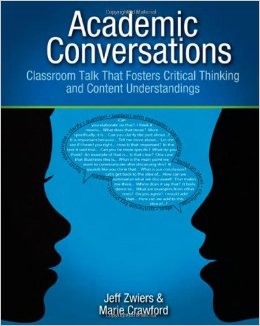by Shaeley Santiago
When two or more people converse, their ideas mix and interact to create new knowledge. Talkers walk away from the conversation with much more than they could have thought up on their own. Like flowers that rely on bees to pollinate them, we need the ideas of others for our minds to thrive. (Zwiers & Crawford, 2011, p. 18)
convo_skills_poster  As language educators, we recognize the critical role of speaking when learning a language. Yet encouraging our students to have meaningful discussions in class can sometimes be like pulling teeth. Jeff Zwiers and Marie Crawford have written a very practical text in Academic Conversations that not only extols the virtues of conversations in five different categories but also provides teachers with a wealth of activities, structures, and supports to explicitly teach students how to have productive conversations about a wide variety of academic topics.
As language educators, we recognize the critical role of speaking when learning a language. Yet encouraging our students to have meaningful discussions in class can sometimes be like pulling teeth. Jeff Zwiers and Marie Crawford have written a very practical text in Academic Conversations that not only extols the virtues of conversations in five different categories but also provides teachers with a wealth of activities, structures, and supports to explicitly teach students how to have productive conversations about a wide variety of academic topics.
The book begins with a review of more than twenty specific benefits of academic conversations organized into the following five categories.
- Language and literacy Oral language is foundational for reading and writing as well as the skills of argumentation, group discussion, and listening for understanding.
- Cognitive Benefits in this dimension range from critical thinking skills and creativity to negotiating meaning.
- Content learning Conversation helps build knowledge through connections and the mixing of ideas that lead to new and deeper understandings.
- Social and cultural Interacting with peers creates an environment of learning and access to the power of language for influencing and impacting other people..
- Psychological Engagement, motivation, confidence, choice, and voice are all important psychological outcomes of academic conversations.
Besides these benefits, improved speaking aligns with 21st century skills for a global economy like those explicitly listed in the Common Core State Standards and lists from employers of target skills in their employees.
So how do teachers explicitly teach these critical skills of academic conversation to their students? Zwiers and Crawford focus on five core conversation moves.
- Elaborate and clarify
- Support ideas with examples
- Build on and/or challenge a partner’s ideas
- Paraphrase
- Synthesize conversation points
These skills are represented in the Constructive Conversation Skills Poster (download PDF) available as one of the Lesson Tools on Zwiers’ Academic Language Development Network website. The site includes a number of other resources such as exemplar lessons and videos as well as related publications.
Once teachers understand the five core conversation skills, the third chapter of Academic Conversations presents a series of activities including graphic organizers and sample figures to support activities that will fit nearly any topic. Chapter 6 focuses on using conversation activities to build students’ vocabulary and grammar. Chapters 7-9 go a step further by addressing the specific academic areas of language arts (Chap. 7), history (Chap. 8), and science (Chap. 9), delving into discipline-specific issues. Other chapters include information on setting up effective tasks to engage students in conversations (Chap. 4), training students to be more independent in their conversations (Chap. 5), and how to assess conversations or content learning expressed through conversations (Chap. 10).
Overall, Academic Conversations contains a wide variety of activities designed to help classroom teachers of multiple ages and content areas explicitly teach the skills necessary for students to talk about what they are learning. If you have any doubt why conversation is an important way to help students learn, reading through the benefits listed in book will convince you of its value. If you are convinced but struggling with how to better facilitate deep discussions between students in your class, then the practical activities in this book will help you reach that goal.
Zwiers, J. and Crawford, M. (2011). Academic Conversations: Classroom Talk That Fosters Critical Thinking and Content Understandings. Portland, ME: Stenhouse.
Shaeley Santiago, ESL Instructional Coach for Ames Community Schools in Ames, Iowa, is an avid user of technology for professional development. In addition to her duties for Ames schools, Shaeley also teaches classes for Drake University’s teacher education program.
photo credit: 2013 09 26 COE orientation 937 via photopin (license)








